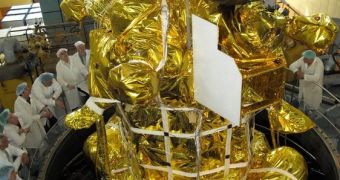Officials with the Russian Federal Space Agency (RosCosmos) announced recently that they plan to launch the Phobos-Grunt spacecraft within three weeks. This is a sample-return mission that the Russians have been working on for some time, and it's aimed at one of the diminutive Martian moons.
Phobos and Deimos are the two moons orbiting the Red Planet. They are very small, with diameters of 22.2 and 12.6 kilometers (13.7 and 7.8 miles), respectively. These small dimensions made some astronomers wonder about the origins of these objects.
Numerous proposals have been made, suggesting that they may have been produced by collisions between Mars and space impactors such as comets and asteroids. Other scientists say that they are in fact captured asteroids that strayed to close to the planet, and got caught in its gravitational field.
It will be the goal of Phobos-Grunt to establish the exact origins of Phobos, as well as learn as much as possible about it. The spacecraft will also contain a sample-return mission, a smaller probe that will land on the moon, scoop up some regolith, and then return to Earth to deliver it to researchers.
Russia's last attempt to explore the Red Planet took place about 15 years ago, when the Mars 96 space probe was launched. The mission failed before it could leave Earth's orbit, crashing back into the ocean after an unknown error.
If successful, Phobos-Grunt will be the first of two Mars-bound missions for 2011. The second one, currently scheduled to launch just two weeks after the Russian spacecraft, is the NASA Mars Science Laboratory (MSL) rover Curiosity.
RosCosmos estimates that the Zenit 3-F delivery system that will carry the mission will be ready for launch from the Baikonur Cosmodrome in Kazakhstan as early as November 5. The agency says that its launch window extends until November 25, Universe Today reports.
“November will see the launch of the Phobos-Grunt interplanetary automatic research station aimed at delivering samples of the Martian natural satellite’s soil to Earth,” RosCosmos Chief Vladimir Popovkin told the State Duma recently, as quoted by the Voice of Russia news agency.
Initially, the spacecraft was supposed to launch in 2009, during the last window of opportunity. However, RosCosmos officials decided to cancel the mission for the time being, in order to make sure that all technical problems plaguing the spacecraft were properly taken care of.

 14 DAY TRIAL //
14 DAY TRIAL //